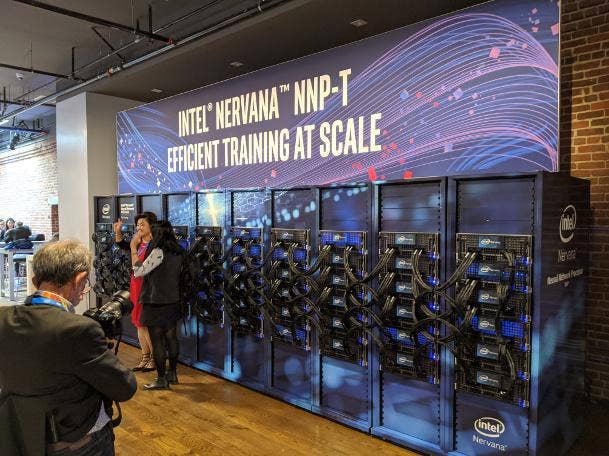Intel Axes Nervana AI Chips In Favor Of Habana Labs
'By moving to a single hardware architecture and software stack for data center AI acceleration, our engineering teams can join forces and focus on delivering more innovation, faster to our customers,' Intel says of its decision to move forward with Habana Labs' AI chips in place of Nervana.

Intel said it is ending work on its Nervana neural network processors in favor of the artificial intelligence chips it gained with the chipmaker’s recent $2 billion acquisition of Habana Labs.
The Santa Clara, Calif.-based company said Friday it has ended development of its Nervana NNP-T training chips and will deliver on current customer commitments for its Nervana NNP-I inference chips, so that it can move forward with Habana Labs' Gaudi and Goya processors in their place.
[Related: Intel Data Platforms Group: New Executive Office Chases ‘Big Picture’]
"Habana product line offers the strong, strategic advantage of a unified, highly-programmable architecture for both inference and training," Intel said in a statement provided to CRN. "By moving to a single hardware architecture and software stack for data center AI acceleration, our engineering teams can join forces and focus on delivering more innovation, faster to our customers."
Analysts questioned whether Intel would move forward with Nervana after the chipmaker announced its acquisition of Habana Labs in mid-December. The deal was only announced a little over a month after Intel in November revealed more details of its Nervana chips, which were meant to compete with Nvidia's growing footprint of GPUs in the AI acceleration market.
Intel had been developing the Nervana chips since it acquired the namesake company, Nervana Systems, for a reported $408 million in 2016. Naveen Rao, who is head of AI Platform Groups as part of Intel's new Data Platforms Group, is one of Nervana's co-founders.
Intel said the decision was made after input from customers and that moving forward it would take advantage of its "combined AI talent and technology to build leadership AI products."
"This roadmap decision aligns to Intel’s AI Strategy and our commitment to deliver heterogenous AI solutions that fit our customers’ evolving power and performance needs – from the intelligent edge to the data center," the company said.
Karl Freund, who leads consulting for high-performance computing and deep learning at analyst firm Moor Insights & Strategy, said while he predicted that Intel would possibly nix Nervana in favor of Habana Labs, he's surprised the company did it so fast.
"They are more willing to adapt. They're willing to listen," he said.
Freund, who broke the news of Nervana's end Friday, said Intel's fast decision-making stands in contrast to when the chipmaker previously attempted to break into the AI acceleration market with a product line called Xeon Phi several years ago. The analyst said Intel had worked on multiple iterations of Xeon Phi for years despite feedback from industry players that its small core approach wasn't favored.
But by making a quick pivot on its AI strategy in response to feedback from customers, Intel demonstrated that it has finally learned its lesson, according to Freund.
"I like to say a technology innovator needs to have rose-colored glasses, but a successful innovator needs to know when to take the glasses off and see the world for what it is," he said.
That Intel made such a quick decision, Freund said, speaks to the fact that it's important to get things right in the AI silicon market — which Intel has previously said will grow to $25 billion by 2024.
"It's still early innings, "he said. "If the game was half over, they wouldn’t jettison the product."
Eliot Eshelman, vice president of strategic accounts and HPC initiatives at Microway, a Plymouth, Mass.-based high-performance computing Intel partner, agreed with Freund’s sentiment.
"In some ways, ‘fail fast’ is maybe the right choice, especially for a market that is moving so quickly," he said. "There's still a road for their partners."